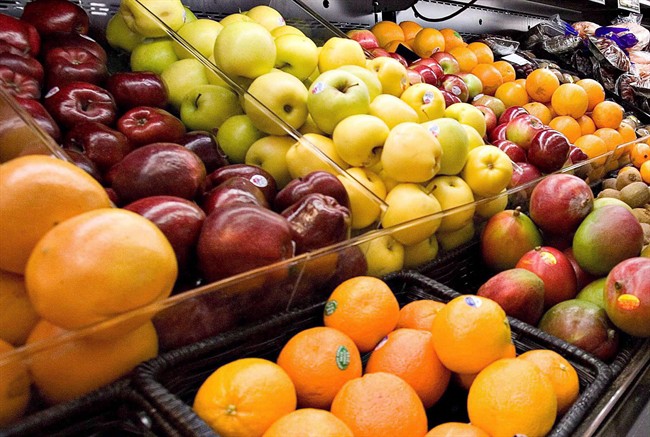Is organic food worth the price premium? It’s the classic grocery store dilemma. On the one hand, your family dinner table deserves only the best. On the other hand, your wallet can only stretch so far.

READ MORE: How much of your budget should you spend on groceries?
Whether or not to buy organic is a personal decision, said Mike von Massow professor of Food Agriculture and Resource Economics at the University of Guelph.
Massow’s own grocery cart regularly includes some organic products. For the most part, though, he happily picks conventionally-grown produce and meat, he told Global News.
READ MORE: The Dirty Dozen and Clean 15: 2017’s list of fruits, vegetables with the most pesticides
Science won’t give a clear-cut answer to the question of whether organic food is “better,” he noted. There are trade-offs in both cases and answers that become less definitive depending on the product under consideration.
But consumers weighing the pros and cons of organic can keep the following in mind:
Organic and conventionally-grown food are equally nutritious
“From a nutrition point of view, there is no difference between organic and traditionally produced products,” said Massow. On this, he added, the science is “reasonably definitive.” This holds for both crops and meat.
WATCH: How a healthy diet can help you fatten up your wallet even as you slim down your waistline

Organic products don’t necessarily have fewer pesticides — in fact, they may have more

Get weekly money news
There is also no appreciable difference between organic and non-organic products from a food-safety perspective, according to Massow.
On the one hand, even organic growers use pesticides. On the other, “testing shows little if any pesticide residue on conventionally grown products,” he noted.
In fact, organic farmers are often the ones who have to use larger quantities of pesticide because they can only use the natural variety of insect-killers, said Sylvain Charlebois, dean of the Faculty of Management at Dalhousie University.
READ MORE: If you’re going to do one thing for a healthier 2017, choose one of these
That’s because chemical pesticides generally repel a much wider range of pests than any single natural pesticide, he told Global News.
The use of manure in organic agriculture can also be a factor in the spread of bacteria like E. coli and salmonella, said Charlebois.
Over the past 10 years or so, Canada has seen more food-safety recalls for organic products, proportionally, than for conventional products, he noted.
As far as fruit and vegetable, the takeaway for consumers is “wash what you buy, no matter what you buy.”
WATCH: Dirty Dozen and Clean Fifteen – a list of produce with the most and least pesticides

Organic farming may generally better for the environment
But Massow and Charlebois said that, on the whole, organic agriculture may have a smaller environmental footprint.
That’s mostly because the risk of groundwater contamination from organic farming is lower, said Massow.
And organic farmers can rightly point out that they never used neonicotinoids, also known as neonics, the controversial pesticides that have been linked to shrinking bee populations worldwide.
Traditional agriculture has been making “dramatic improvements” to reduce its impact on the environment, he noted. But scientists don’t know what they don’t know, and they sometimes learn about new risks they weren’t aware of before.
READ MORE: Can’t afford lettuce and celery these days? Here’s what’s happening
It isn’t a black and white picture, though.
Organic farming is much less efficient when it comes to land use, although yields vary considerably depending on the crop, Massow added.
READ MORE: Average Canadian family to spend $420 more on food in 2017: report
On the other hand, proponents of organic argue yields and efficiency could be significantly improved if the food industry devoted as much research and money to organic farming as it does conventional agriculture. Massow said.








Comments